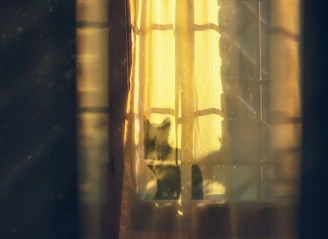Fireworks are a tradition from Bonfire Night to New Year’s Eve but for cats, loud and sudden noises can leave them feeling stressed. If you’re worried about cats and fireworks, read our expert guide on keeping your cat relaxed and safe.
Aside from keeping your cat inside on the evenings of fireworks displays, there are a few tips and tricks to ensure they feel settled. Watch our video for advice on cats and fireworks from our experts.

If you’ve got a cat, you might notice that cats and loud noises aren’t particularly compatible. Cats have very sensitive hearing, meaning they hear things humans do but a lot louder.
For cats, Bonfire Night or New Year’s Eve is not only a noisy and unwelcome celebration, it is a highly unpredictable time. As creatures of habit, loud bangs and flashes of light take them by surprise, which makes them fearful.

Even the most confident feline might struggle with the sound of fireworks, and stressed cats may react in many different ways.
Frightened cats might appear startled by noises, run away or hide in the house. You might notice that your cat acts out of the ordinary, either toileting in the house or excessively grooming themselves. Other signs of cats stressed by fireworks include:
If you know that your cat becomes distressed at the loud noises and lights of Bonfire Night and other festivities, the best thing to do is to keep your cat inside after dark. Giving them their own ‘cat curfew’ means they’re less likely to stumble across a noisy fireworks display. They’ll soon get used to curling up on the sofa in the evening. To keep your cat indoors, make sure your cat has:
Keep all windows, doors and cat flaps closed to ensure they don’t escape. Cats can also squeeze into tight spaces, especially when they’re feeling frightened. You might want to make sure that any unsuitable areas are blocked off to keep them safe.
There are lots of different ways you can help your cat stay safe and ensure they are settled on a fireworks night.
Cats that are spooked tend to flee and if you’ve forgotten to close a window, they’ll soon find it! Keeping your cat’s microchip details up to date with your current address and phone number will give you peace of mind that if they were to disappear, you’d have the opportunity of a happy reunion. Find out more about microchipping your cat.
If your cat is particularly anxious around fireworks, you might want to avoid leaving them alone in the house. Knowing you’re around can help them to feel settled. If you do leave the house, make sure you set up a safe and comforting space for them to relax in while you’re gone.

You might be tempted to keep your cat in one room, away from the noise and chaos of fireworks. While well-intended, some cats can feel more stressed if confined to one room. Let them have full access to the areas of the house they would usually have access to, and they’ll be content in exploring their surroundings.
Does your cat like to hide when they are stressed? This is a usual behaviour for anxious cats. A space to retreat to is likely to make them feel happier. Try a cardboard box or a cat bed lined with blankets. Some cats like to get up high as it gives them a better vantage point. Cat towers are ideal for this, but you can recreate the same feeling with a cosy bed on top of a wardrobe or a box on top of a sturdy shelf.

You might notice that the flashes of light that come with fireworks can make your cat feel anxious, especially if there is a display close by. Try closing the curtains or covering windows with blinds to see if it makes a difference.
Background noise, like the radio or television, can help to reduce the impact of sudden sounds that come with fireworks displays. Some types of music, like classical music, can be particularly calming for cats.
Cat feeling stressed? Trying to pick them up or cuddle them might make them more fearful. Cats can also take a while to calm down, so giving them some space is a good idea. They’ll soon come to you when they’re ready. If your cat does seek your affection, it is fine to give them some attention, let them guide you on how they feel.
A new toy, like a fishing rod toy or catnip mouse, can be a great distraction from the noise of fireworks. Get them something special and they might focus on that instead.
If you haven’t tried them before, plug-in diffusers such as Feliway are great additions for households with anxious cats. You simply plug them in where your cat spends the majority of their time (your living room, for example) and the pheromones help to soothe your cat during stressful times. Try using it a couple of weeks before the fireworks season begins to see if it makes a difference. Find out more about Feliway.
It can be difficult to know what to do about cats and fireworks, especially if your cat is usually confident! Carry on as you normally would and your cat should soon know they’re in a safe place and hopefully feel more content.
If you’re worried your cat is still stressed out during fireworks season, it is best to visit your vet for more advice.
They may refer you to a qualified behaviourist, who can help with reducing your cat’s stress.
Speak to your vet sooner rather than later too. Making sure your cat can cope with noises and lights may take time and you’ll need lots of patience to help them through.